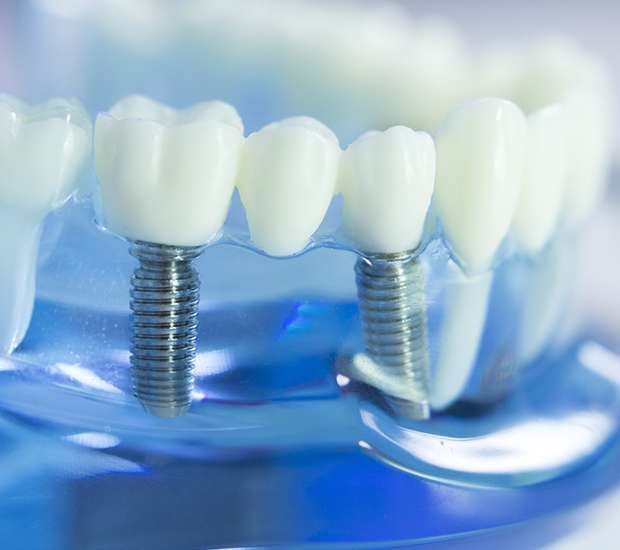Dental Implants In Huntersville, NC
A Lasting Solution for Missing Teeth in Huntersville, NC
If you're struggling with missing teeth, you know how it can impact your confidence, speech, and ability to enjoy your favorite foods. Fortunately, modern dentistry offers a permanent and natural-looking solution: dental implants. At Lake Norman Dentistry, our top dentist in Huntersville, NC, Dr. Scott Guice provides quality dental implant treatments to patients in Huntersville, NC, and surrounding areas like Cornelius, Davidson, and Mooresville.
Contact our dental office in Huntersville by calling (704) 895-3858 to understand why dental implants are the gold standard for tooth replacement and how they can transform your smile.
What Are Dental Implants?
Dental implants are artificial tooth roots made of biocompatible titanium that fuse with your jawbone, creating a strong foundation for a replacement tooth or bridge. Unlike traditional dentures or dental bridges, implants provide unmatched stability and prevent bone loss, helping maintain your facial structure and oral health.
A dental implant consists of three main parts:
- The Implant Post – A titanium screw that acts as a tooth root and integrates with the jawbone.
- The Abutment – A small connector that attaches to the implant and holds the crown.
- The Crown – A custom-made artificial tooth that blends seamlessly with your natural teeth.
Benefits of Dental Implants
There are many reasons why dental implants are the preferred choice for tooth replacement. Here are some key benefits:
Natural Look and Feel
Dental implants are designed to mimic natural teeth in appearance and function. Once in place, they feel just like your real teeth, allowing you to eat, speak, and smile with confidence.
Long-Lasting Durability
With proper care, dental implants can last a lifetime. Unlike dentures, which may need frequent adjustments or replacements, implants are a one-time investment in your oral health.
Prevention of Bone Loss
When you lose a tooth, the jawbone beneath it can deteriorate over time due to lack of stimulation. Dental implants integrate with your bone, preventing this loss and preserving your facial structure.
Improved Comfort and Convenience
Unlike dentures that can slip and cause discomfort, implants stay securely in place. They eliminate the need for messy adhesives and daily removal.
Enhanced Oral Health
Traditional bridges require altering adjacent teeth for support, while implants stand independently without affecting surrounding teeth. This helps maintain overall oral health and prevents unnecessary tooth damage.
Who Is a Candidate for Dental Implants?
Dental implants are a great option for many patients, but the best candidates typically have:
- Good overall health
- A strong, healthy jawbone (or willingness to undergo bone grafting if needed)
- Healthy gums, free of untreated gum disease
- A commitment to good oral hygiene
If you're unsure whether implants are right for you, Dr. Guice at Lake Norman Dentistry will assess your oral health and recommend the best treatment plan for your needs.
The Dental Implant Process at Lake Norman Dentistry
Getting dental implants is a multi-step process that typically takes several months to complete. Here’s what you can expect:
Consultation and Evaluation
During your initial visit, Dr. Guice will examine your teeth, gums, and jawbone using advanced imaging techniques to determine if you’re a good candidate.
Implant Placement Surgery
If approved, the next step is placing the implant post into the jawbone. This minor surgical procedure is performed under local anesthesia for your comfort.
Healing and Osseointegration
Over the next few months, the implant fuses with the bone in a process called osseointegration, creating a solid foundation for your new tooth.
Abutment and Crown Placement
Once healed, the abutment is attached to the implant, followed by the custom-made crown. Your new tooth will look and function just like a natural tooth!
Check out what others are saying about our implant services on Yelp: Dental Implants Huntersville
Dental Implant Aftercare: Ensuring Long-Term Success
To keep your implants in top condition, follow these essential care tips:
- Practice Good Oral Hygiene: Brush twice daily and floss regularly to prevent gum disease.
- Visit Your Dentist Regularly: Routine checkups at Lake Norman Dentistry will help detect any potential issues early.
- Avoid Hard Foods and Smoking: These can damage your implants and affect healing.
Why Choose Dr. Guice for Dental Implants in Huntersville, NC?
Dr. Guice is a trusted provider of high-quality dental implant solutions in Huntersville, NC, serving patients from Cornelius, Davidson, Mooresville, and beyond. With years of experience and a passion for restoring smiles, Dr. Guice and his team at Lake Norman Dentistry ensure that every patient receives personalized, top-notch care in a comfortable setting.
One of our satisfied patients, Scott, shared his experience:
"Great work. I can’t say enough good things. The doctor performed an implant and root canal with no issues. I was apprehensive because of poor work from my previous dentist, the team at Lake Norman Dentistry has fixed all of those. Getting the right care for your teeth will save you time, money, and pain."
Invest in a Healthier, More Confident Smile at Lake Norman Dentistry
Dental implants are more than just a cosmetic fix—they are a long-term investment in your oral health and quality of life. If you’re looking for a reliable, natural-looking solution to replace missing teeth, Dr. Scott Guice at Lake Norman Dentistry in Huntersville, NC, is here to help. Schedule a consultation with Dr. Scott Guice by calling (704) 895-3858 to take the first step toward restoring your beautiful smile!
There is 40 years of data behind dental implants, with success rates of about 98 percent
Implant FAQ
Q. I need to replace two missing teeth next to each other. Can I just have one implant placed and attach it to one of my natural teeth and make a bridge?
A. Generally, this is not a good idea. We find that it is generally much better not to attach implants to teeth. We frequently attach implants to each other, which can improve strength and works well. So in a case like this, although it may be more expensive in the short term to place two implants instead of one, the long-term success is likely to be much better with the two implants.
Q. I lost my upper back teeth on one side and have gone for years without doing anything about it. My sinuses always seem to bother me more on that side than on the side that I have back teeth. Could these problems be related to one another?
A. In a large majority of people who are missing their upper back teeth for a long period of time, is the increasing downward growth of the maxillary sinus. At birth, it is the size of a pea and progressively grows as the skull matures. This growth is at the expense of the surrounding bone. If you are considering replacing those upper back teeth with fixed teeth that stay in all the time, it may be necessary to perform a sinus elevation procedure to allow room for placement of dental implants into this area to support those teeth. This involves placement of bone and/or bone substitutes into an area which was previously occupied by the lower part of the maxillary sinus. Most importantly, this procedure increases the available bone use to place implants and restore the missing back teeth.
Q. I've had dentures for several years and have lost a lot of jawbone. My lower dentures are floaters and I need help. Is there still hope for me?
A. In most cases, with the new options available today in the field of dental implants, some form of treatment is possible. We encourage people to get help as soon as possible if they are already having some problems with their current situation. These problems include excessive use of denture adhesives, chewing only soft food, unable to taste some foods, constant mouth sores, unhappy with the appearance of one's teeth and bite position (in some cases the nose and chin getting closer together). The sooner we correct the problems with dental implants, the more choices one has available for treatment. If you have any or all of the above symptoms, implants can very well be the answer for you.
Q. I am missing all of my teeth and am now wearing a full upper and lower denture. I can no longer tolerate my lowers. Will I need an implant for every tooth I am replacing on the lower jaw?
A. It is not necessary to have an implant for every tooth that is being replaced. The number of implants necessary to provide support depends on the type of implants used and the type of teeth (removable vs. non-removable) that will be attached to the implants. A thorough oral exam and panoramic x-ray is all that is necessary in most cases, to determine which implant can be used and how many must be used. Sometimes additional X-rays or CT scans are used in more complicated cases.
Q. I consulted a dentist several years ago about using implants to replace my lower denture and he told me that I did not have adequate bone available to place enough in-the-bone implants without danger of fracturing my now fragile jawbone. Are there any alternatives?
A. Because of the advances in the field of implantology, there are now more choices and techniques. It is rare for a person to not be able to receive an implant or a combination of implants. Today we have available many types of implants designed to accommodate multiple problems.
Q. I had a root canal on a tooth that fractured and now it has to be removed. Can it be replaced with an implant or do I have to have a bridge or a partial?
A. Teeth that have root canals can fracture more easily than other teeth because they are weaker and somewhat dehydrated. They can sometimes be as brittle as glass. In the past, the best available treatment was to remove the tooth and file down the adjacent teeth to make a bridge - caps on the adjacent teeth with an attached "dummy" tooth between. Sometimes this still is the only way. However, in many cases an implant can replace the fractured tooth and we will not need to grind down a tooth to at all.
Definition of Dental Implant Terminology
- Abutment
- An abutment is a component that attaches to the dental implant so a professional can place a dental crown to provide patients with an artificial, aesthetically pleasing and fully-functional smile.
- Bridge
- Multiple replacement teeth that are fixed in place via attachment to dental implants, natural adjacent teeth, or a combination of the two.
- Dental Crown
- A crown is an artificial tooth, usually consisting of porcelain, which covers the top of the implant to provide people with an aesthetically pleasing and fully-functional tooth.
- Dental Implant
- A dental implant is an artificial tooth root that is placed into your jaw to hold a replacement tooth or bridge. Dental implants may be an option for people who have lost a tooth or teeth due to periodontal disease, an injury, or some other reason.
- Endosteal (endosseous)
- Endosteal is a type of dental implant that a professional places in the alveolar and basal bone of the mandible that transcends only one cortical plate.
- Eposteal (subperiosteal)
- Eposteal is a type of dental implant that conforms to whichever edentulous surface of an alveolar bone is superior.
- Implant-Supported Bridge
- An implant-supported bridge is a dental bridge that professionals fix in place with the use of dental implants inserted in the jaw to create a sturdy set of artificial teeth.
- Osseointegration
- Osseointegration is the process in which a titanium dental implant fuses with the surrounding bone over several months after an oral health professional places the implant in the jaw.
- Periodontal
- Literally “around the tooth”
- Resorption
- Resorption is the process in which the body absorbs the calcium from the jaw since there are no tooth roots to cause the necessary stimulation and proceeds to use the calcium in other areas.
- Transosteal (transosseous)
- Transosteal is a type of dental implant that includes threaded posts which penetrate the superior and inferior cortical bone plates of the jaw.
Back to top of Dental Implants




